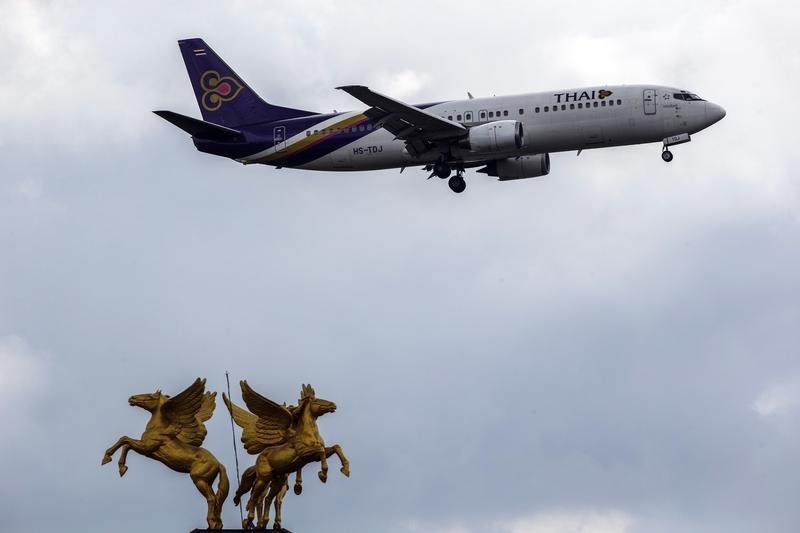By Jessica Jaganathan and Victoria Bryan
SINGAPORE/BERLIN (Reuters) - Global airlines, looking to lock in huge savings, are preparing to hedge more jet fuel to fix prices as they bet a slide in crude oil to six-year lows may peter out near $40 a barrel.
Some airlines have already stepped up hedging, especially after benchmark Brent crude
In Europe, airlines such as Aer Lingus (I:AERL) and Ryanair (I:RYA) are aiming to take advantage of the low oil prices to lock in fuel costs into 2016 and beyond. Thai Airways (BK:THAI) plans to hedge 100 percent of its fuel purchases this year.
"If you a sensible hedger, you have to look at this as an excellent opportunity," said Robert Campbell, head of oil products research at Energy Aspects.
Current crude output can't be sustained at these prices, Campbell said, and with "some increase in demand and some reduction in supply ultimately the price will be forced higher".
Jet fuel can account for between 20 and 50 percent of an airline's operating costs, and swings in oil prices can mean a huge boost or hit to profits. In December, the International Air Transport Association (IATA) said lower fuel prices could mean that airlines globally will report their strongest profit margins in more than five years in 2015.
Still, Brent crude slipping 60 percent since June has caught many by surprise. [O/R]
U.S. airlines that hedged based on higher oil prices, such as United Airlines (N:UAL), have had to dump losing bets and are now reviewing their strategies for protecting themselves from oil market volatility.
"Over the last six months of 2014, very few airlines were brave enough to go into the market and if they did, it was in very small volumes," said Shukor Yusof, founder of aviation research firm Endau Analytics.
At least one Asian carrier, South Korea's Asiana Airlines (KS:020560), has stopped hedging since November due to recent price volatility, while Germany's Air Berlin (DE:AB1) has said it is considering reducing its hedging rate.
SOME AIRLINES STILL SKITTISH
Now, hedging interest has picked up, according to brokers and traders, although some airlines remain skittish because of free-falling prices.
In line with benchmark crude, jet fuel prices
"Even though hedging volumes have picked up, they are still limited," said a fuel trader with a Singapore-based bank handling hedges for airlines.
Airlines typically hedge some of their fuel needs - or buy fuel in advance at pre-determined prices - to reduce the impact on earnings from wide swings in the market.
But many carriers, particularly in Asia, have been cautious about hedging since 2008, when airlines scrambling to lock in fuel costs as crude surged above $100 a barrel for the first time saw oil plummet to less than $40 before year-end.
And with prices dropping, airlines may see buying in the spot market as a better option than possibly getting caught on the wrong side of a long-term hedge, Yusof said.
Air India (AIN.UL), for instance, which goes largely unhedged, projected it could shave as much as $375 million off its annual fuel costs of about $1.5 billion based on savings made since prices started to fall in June 2014, according to its director of finance S Venkat.
Still, Air India is starting to consider hedging between 30 and 40 percent of its fuel needs, or about 300,000 barrels a quarter at current jet fuel prices, Venkat said.
Ryanair, Aer Lingus and Thai Airways are also among those looking to use the low oil price to extend their hedges.
Aer Lingus said last week it had increased its hedging, with 90 percent of its requirements for 2015 now hedged at an average jet fuel price of $830 per tonne (about $104 a barrel), compared with $954 a tonne for 2014.
Ryanair said in December, that in addition to current hedges, it was hedging 20 percent of its fuel purchases in the first half of the year to March 2017 at about $810 per tonne.
Other carriers - including Korean Airlines (KS:003490) along with Europe's biggest airlines Lufthansa (DE:LHAG), British Airways owner IAG (L:ICAG) and Air France-KLM Group (PA:AIRF) - have said they are not planning major changes to their hedging strategies in response to oil price falls.
